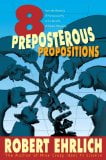 Eight Preposterous Propositions: From the Genetics of Homosexuality to the Benefits of Global Warming
Eight Preposterous Propositions: From the Genetics of Homosexuality to the Benefits of Global Warming
By Robert Ehrlich
Princeton University Press, £11.95 (pbk), ISBN 0-691-12404-3
In his previous book, Nine Crazy Ideas in Science, Ehrlich discussed outlandish scientific ideas and gave them a “cuckoo” rating according to how crazy he reckoned they were. Having a high cuckoo rating didn’t mean that there was no good evidence for a hypothesis, but reflected its sheer strangeness, as instanced by the disturbingly paradoxical ideas of quantum physics. In this new study, he replaces that grading system with degrees of flakiness, from zero to a maximum of four, to rate ideas that are not so much technical puzzles for scientists but issues that may concern the general public. His aim is to help the lay reader to assess the evidence and the reasoning behind the propositions in question.
These propositions are actually expressed as questions: Is homosexuality primarily innate?, Is Intelligent Design a scientific alternative to evolution?, Are people getting smarter or dumber?, Can we influence matter by thought alone?, Should you worry about global warming?, Is complex life in the universe very rare?, Can a sugar pill cure you?, and Should you worry about your cholesterol?
The chapter on that man-made plague, Intelligent Design, is suitably damning, yet, bizarrely, Ehrlich only bestows a 3-flake rating. The excuse for this is that human intervention in how organisms reproduce will increasingly outweigh natural selection, thus reflecting human design. Perhaps he has forgotten the detailed discussions of artificial selection in Darwin’s work. At any rate, this is an odd lapse. The chapter investigating the placebo effect is perhaps the most interesting part of the book. Ehrlich warns of the unblinding of double-blind tests using passive placebos (that don’t mimic drug side-effects): “studies show that with passive placebos between 78 and 88 percent of patients and physicians in antidepressant trials can correctly identify whether the drug being administered is the placebo or the active drug, based on the presence or absence of side effects and other subtle cues.” This unblinding would boost the apparent relative effect of the drug being tested.
Since useful and well-written books about complex issues seem to be quite rare in the universe, this one is warmly recommended.
Paul Taylor

